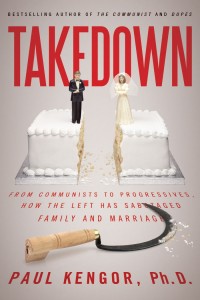Abolition of the family! Even the most radical flare up at this infamous proposal of the Communists. Karl Marx, The Communist Manifesto, 1848 (quoted in the introduction of Takedown)
Anyone interested in understanding the full, historical context of the recent Obergefell decision need look no further than Takedown, Paul Kengor’s latest, and perhaps most essential, book.
Kengor, a best selling author of over a dozen books, is a Professor at Grove City College and the Executive Director of the school’s Center for Vision and Values. He has appeared on MSNBC, C-SPAN, NPR, BBC and Fox News, and is
an internationally recognized authority on the presidency, the Cold War, and communism, with extensive experience in Soviet archival research.
As with each of his earlier books, Dr. Kengor’s Takedown is both thoroughly sourced and excellently written. Kengor takes us back through the earliest days of a movement (starting in the mid-1800s) whose primary mission was to “fundamentally transform” society – striking first and foremost at the very heart and existence of the family.
He then traces that on-going mission to its most recent configuration, a mission which has reached a point to where at least one of its leaders is comfortable enough to candidly and publicly proclaim that
it’s a no-brainer that the institution of marriage should not exist
and that lying about this ultimate goal is certainly an acceptable form of engagement in this latest, most divisive, most epic societal battle (quoting Masha Gessen, page 2).
Interestingly, Kengor notes that, as much as the earliest proponents – such as Marx and Engels (in the 1850s) and the CPUSA (in the 1950s) – may have argued for a massive and radical up-ending of the family structure for the benefit of the state, there is no historical evidence that would likely tie them to anything as radically transforming as the outcome of the Obergefell decision is likely to be over the next two or three generations.
It seems that we have entered into truly historic and uncharted territory.
Kengor spends much needed time on the history of this march towards radical transformation, commencing with revolutionary communism.
Among many other documented and highlighted sources, Kengor expertly excerpts some powerful passages from one of communism’s earliest, fiercest, and savviest opponents – Venerable Archbishop Fulton J. Sheen.
Kengor begins with the following from Sheen’s book, Communism and the Conscience of the West:
Communism in its philosophy and its early practice was so antimoral and antihuman that it was necessarily opposed to the family unit of society.
Then, quoting from “the Bolshevik’s state policies and laws enacted against marriage and the family” (citing the Matrimonial Codes of 1918 and 1927), he noted that the Soviets
affirmed that “all children belong to the state,” as opposed to the mother and father
Moreover, the Soviet Family Code of October 22, 1918, Sheen noted, ordained that “all church marriages were thereby invalid and therefore could be freely dissolved by the will of either party.”
And, as Kengor points out, the Soviet state’s “attitude was captured in the Thirteenth Congress of the Communist Party of the Soviet Union, which decried the family as a ‘formidable stronghold of all the turpitudes of the old regime.'”
Kengor then further observes that
Core to the family’s liberation from its reactionary “turpitudes” was the liberation of the wife and mother. Sheen listed another early Bolshevik decree that declared all women ages seventeen to thirty-two to be likewise deemed “property of the State,” with the “rights of husbands” to consider them their wives “abolished.”
As communism battled mightily to exploit the family from its earliest days in order to first serve the needs of the state, the Church, Sheen observed, played an “unwavering role” as the only “solid moral force in the world that has been consistently opposed to the new barbarism.”
Where communism and its later – in some cases, even more radical configurations – exist overwhelmingly to exploit individuals for the benefit of the state, the Church has stood in steadfast opposition, seeking to protect and even expand the family, as such, so as to thwart these intrusions, exploitations, and degradations.
As Sheen has sharply noted concerning the Church’s critical role throughout history:
Christianity comes to optimism through pessimism; to resurrection through passion, and to a crown of glory through a crown of thorns; to the glory of Easter Sunday through the ignominy of a Good Friday
Sheen also directly addressed the Russian people of his day, highlighting the key difference in human service to what is merely ephemeral and what truly stands eternal:
Atheism is not natural – take heart that Christ’s tomb is empty, while Lenin’s tomb is not.
Perhaps Sheen’s is still an excellent observation as we rapidly transition into, undoubtedly, morally and legally uncertain times.
There are many more historical and current lessons to be drawn from Dr. Kengor’s latest book.
Takedown is must summer reading and is highly recommended (available through the Amazon link below).
Please do read it.
Peace
Image Credit: Amazon.com













